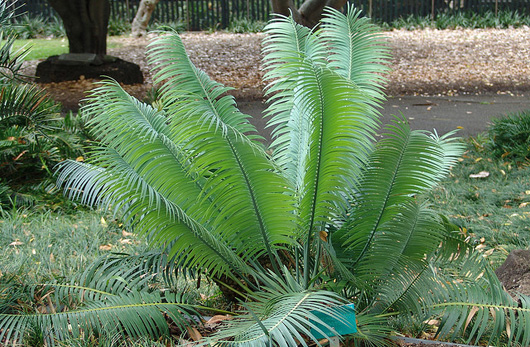South Africa: Proposed reforms in cycad trade may not go far enough
28.02.11
TRAFFIC, the wildlife trade joint monitoring programme of IUCN and WWF today announced concerns over recent proposals from South Africa to tighten up trade laws surrounding cycad plants.
Cycads are an ancient plant group. Slow growing and highly desired in the horticultural trade they have suffered historically from over collection and habitat loss so taken at face value a statement from the South African government would appear good news. The proposal, published for public comment, suggests bringing a halt to the trade in 11 species while restricting the trade in others, say TRAFFIC.
But TRAFFIC says the measures don’t go far enough and is calling on the South African authorities to introduce a blanket trade ban on cycads.
“While the South African government is to be applauded for considering action against the illicit trade in cycads, TRAFFIC is concerned that the measures simply won’t stop the wild extinction of yet more cycad species,” said David Newton of TRAFFIC East and Southern Africa.
Cycad species affected are those in the genus Encephalartos, several of which are commonly known as bread palms or bread trees because their stems can be used to prepare a bread-like starchy food.

Lyndenburg Cycad (Encephalartos inopinus) © Drew-Avery
“Cycads are among the oldest living seed plants, but are today are among the most highly threatened groups of species. South Africa is a global hotspot for cycads, and 31% of the country’s species are classified as Critically Endangered, principally because of severe over-harvesting to supply private horticultural collections,” said Simon Stuart, Chair of IUCN's Species Survival Commission
IUCN, the International Union for the Conservation of Nature, classifies around 70% of Encephalartos species in Africa as threatened with extinction—four species no longer exist in the wild.
All Encephalartos species are listed in Appendix I of CITES, which precludes their international commercial trade.
However, trade in artificially propagated plants from South Africa is still permitted, and despite existing regulations to restrict trade, including new CITES (Convention on International Trade in Endangered Species of Wild Flora and Fauna) regulations promulgated in 2010, the plunder of wild cycad populations has continued.
According to the CITES trade database, over 5,000 cycad plants (Encephalartos species) were reported as exports from South Africa in 2009 alone. All were reported to be artificially propagated.
“Even just monitoring that number of exports to ensure they are all cultivated plants and not illegally wild-sourced is a massive challenge,” says Newton.
He also points out inconsistencies in the government’s proposals, such as no requirement for Critically Endangered cycad species under a certain size to be microchipped, unlike less threatened species.
According to Newton, the proposed new rules would do little to improve regulation of the international trade in cycads.
“The South Africa government recently delisted Abalone [a type of mollusc] from CITES because they were unable to meet the CITES export inspections requirements for farmed Abalone. So why do they now think they will be able to inspect and monitor size limited cycad exports, as proposed in the government gazette, given they have been unable to do so in the past?”
Under CITES rules, the Scientific Authority in South Africa would have to demonstrate what levels of plants could be traded without posing a conservation risk.
Such a study is known as a Non-Detriment Finding (NDF), but these have not yet been completed for all South Africa’s cycads.
Because of the massive task this represents TRAFFIC's conclusions point to a simple solution. “TRAFFIC calls on the South African government to impose a complete ban on the export of cycads until the completion of non-detriments findings and the establishment of biodiversity management plans that will ensure their correct management by all stakeholders,” says Newton.
“This drastic measure is now required given the poor management of this trade over the years and the fact that an increasing number of cycad taxa are becoming extinct in the wild.”
In December 2010 the European Union (EU) imposed a ban on trade in cycad species from South Africa.
Related links:
Qatar: Two Latin American trees protected at CITES talks
18.03.10
Two trees were given protection yesterday at the Convention on International Trade in Endangered Species of Wild Fauna and Flora (CITES) conference taking place in Doha, Qatar.
Qatar: The Mahoganies head list of plants under discussion
18.03.10
As news breaks that talks have failed to protect enigmatic animals such as polar bears and blue-fin tuna, what hope do the plants have?
Qatar: Endangered species on the table
16.03.10
The future trading of many of the world's most endangered species could be decided over the next 10 days in Doha, Qatar at the 15th COP (Conference of the Parties) CITES meeting.